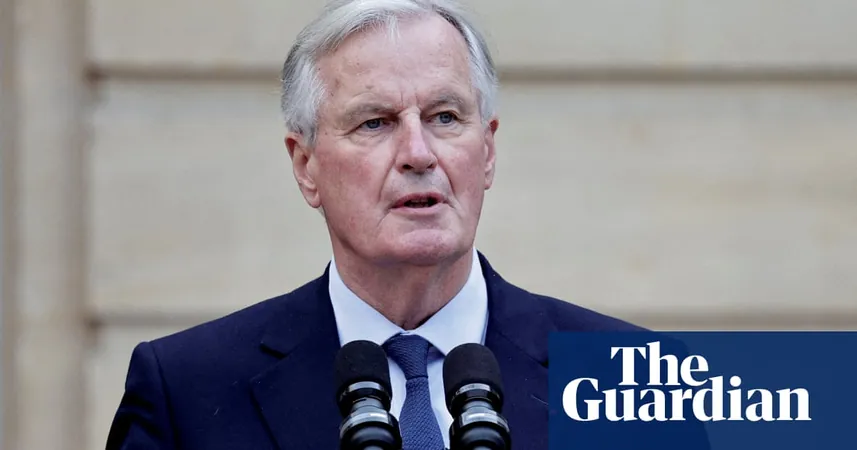
France in Political Turmoil: New Government Faces Immediate Threat of No-Confidence Vote!
2024-09-22
France in Political Turmoil: New Government Faces Immediate Threat of No-Confidence Vote!
In a dramatic turn of events, France's newly appointed government under Prime Minister Michel Barnier is already facing fierce backlash, with opposition parties rapidly moving to introduce a parliamentary motion of no-confidence. The turmoil arises just weeks after President Emmanuel Macron’s snap general election, suggesting a deeply divided political climate as public protests escalate across the nation.
Barnier, the former EU Brexit negotiator, was thrust into the role of Prime Minister after a cabinet reshuffle that signaled a significant shift toward conservative governance. Appointed without a clear mandate from the electorate, Barnier's government has sparked protests from citizens who denounce the new administration as a betrayal of their electoral choices.
The leftist bloc, particularly the New Popular Front (NFP), which emerged as the largest parliamentary group, is leading the charge against the government, claiming it represents the interests of political losers. Jean-Luc Mélenchon, a veteran leftist leader, has labeled the cabinet a “government of the general election losers,” arguing that citizens should have the right to challenge its legitimacy at the earliest opportunity.
Adding to the political pressure, far-right parties have joined the chorus of criticism, with Marine Le Pen’s National Rally branding the new government as “same-old, same-old.” This highlights an unusual, if not unprecedented, unity among factions that typically vehemently oppose one another.
As protests erupted in major cities like Paris, demonstrators voiced their frustration over what they perceive as a dereliction of leadership and a failed electoral process. Prominent figures, including Olivier Faure of the Socialist Party, characterized the cabinet as “reactionary” and fundamentally opposed to the democratic will of the people.
After a weekend of tension-filled negotiations, Barnier assembled a cabinet comprising members primarily from his own center-right Republicans (LR) and Macron’s centrist alliance. However, the lineup attracted immediate condemnation from across the political spectrum. François Hollande, the former Socialist president, suggested that a no-confidence vote could be a viable solution. Meanwhile, the RN's leader, Jordan Bardella, dismissed the government as having “no future whatsoever.”
The intricacies of French politics complicate the possibility of a successful no-confidence motion. For it to pass, an absolute majority in parliament would be needed, requiring collaboration between traditionally opposing factions. Political analysts consider this unlikely, as it would necessitate the far-right and leftist forces, often at each other's throats, to unite against Barnier’s administration.
Challenges await as Barnier's government must immediately develop a 2025 budget plan to address the nation's “very serious” financial issues, particularly after receiving warnings from the European Union for breaching fiscal regulations. The onus to craft this pivotal budget will fall to the newly appointed finance minister, Antoine Armand, who is just 33 years old.
In addition, other vital cabinet appointments include Jean-Noël Barrot as foreign minister and Bruno Retailleau as interior minister, who has garnered controversy for his hardline stance on immigration—a topic that raises concerns even among Macron’s allies.
As the political landscape intensifies, Barnier is slated to address the nation through a televised speech, followed by a pivotal address to parliament on October 1st. Will the new government survive the storm, or will France plunge into a political crisis? Stay tuned—this unfolding saga promises to keep us on the edge of our seats!

 Brasil (PT)
Brasil (PT)
 Canada (EN)
Canada (EN)
 Chile (ES)
Chile (ES)
 España (ES)
España (ES)
 France (FR)
France (FR)
 Hong Kong (EN)
Hong Kong (EN)
 Italia (IT)
Italia (IT)
 日本 (JA)
日本 (JA)
 Magyarország (HU)
Magyarország (HU)
 Norge (NO)
Norge (NO)
 Polska (PL)
Polska (PL)
 Schweiz (DE)
Schweiz (DE)
 Singapore (EN)
Singapore (EN)
 Sverige (SV)
Sverige (SV)
 Suomi (FI)
Suomi (FI)
 Türkiye (TR)
Türkiye (TR)